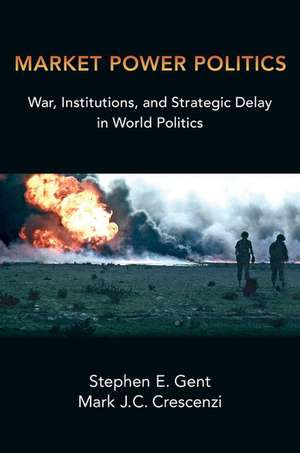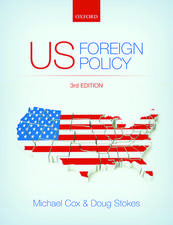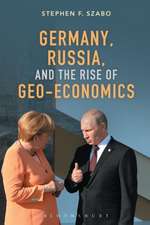Market Power Politics: War, Institutions, and Strategic Delay in World Politics
Autor Stephen E. Gent, Mark J.C. Crescenzien Limba Engleză Paperback – 26 aug 2021
Preț: 180.61 lei
Preț vechi: 220.77 lei
-18% Nou
Puncte Express: 271
Preț estimativ în valută:
34.56€ • 36.01$ • 28.62£
34.56€ • 36.01$ • 28.62£
Carte disponibilă
Livrare economică 03-08 martie
Livrare express 26 februarie-04 martie pentru 67.06 lei
Preluare comenzi: 021 569.72.76
Specificații
ISBN-13: 9780197529812
ISBN-10: 019752981X
Pagini: 280
Ilustrații: 21
Dimensiuni: 234 x 155 x 18 mm
Greutate: 0.44 kg
Editura: Oxford University Press
Colecția OUP USA
Locul publicării:New York, United States
ISBN-10: 019752981X
Pagini: 280
Ilustrații: 21
Dimensiuni: 234 x 155 x 18 mm
Greutate: 0.44 kg
Editura: Oxford University Press
Colecția OUP USA
Locul publicării:New York, United States
Recenzii
Gent and Crescenzi develop an innovative theory of market power politics to explain contemporary territorial disputes as property rights disputes. Their approach helps resolve the puzzling behavior of territorial expansionism in an age where economic interdependence and international institutions are expected to mute or eliminate territorial conflict.
This book provides strong evidence that territorial disputes are not going away. Gent and Crescenzi explain why states like China and Russia continue to press expansionist territorial claims while fully integrated in the world economy. Providing a cutting-edge explanation of property rights and market power politics, the authors address the puzzle of why states are sometimes territorially aggressive and other times constrained by economic interdependence and institutions. The book challenges scholars and policy makers to think more creatively about conflict and resolution of territorial disputes.
This book provides strong evidence that territorial disputes are not going away. Gent and Crescenzi explain why states like China and Russia continue to press expansionist territorial claims while fully integrated in the world economy. Providing a cutting-edge explanation of property rights and market power politics, the authors address the puzzle of why states are sometimes territorially aggressive and other times constrained by economic interdependence and institutions. The book challenges scholars and policy makers to think more creatively about conflict and resolution of territorial disputes.
Notă biografică
Stephen Gent Associate Professor of Political Science, University of North Carolina at Chapel Hill, Mark Crescenzi Nancy Hanes White Distinguished Professor of Political Science, University of North Carolina at Chapel Hill Stephen E. Gent is Associate Professor of Political Science at the University of North Carolina at Chapel Hill. His research largely focuses on the role of third parties in conflict and conflict resolution, including the causes and consequences of military intervention, international mediation, and legal dispute resolution. His work has appeared in the Journal of Politics, International Studies Quarterly, the Journal of Conflict Resolution, and the Journal of Peace Research. Mark J.C. Crescenzi is the Nancy Hanes White Distinguished Professor of Political Science at the University of North Carolina at Chapel Hill. He specializes in the causes of international conflict and conflict resolution, including institutional, economic andreputation-based motivations for violence. He is the author of Economic Interdependence and Conflict in World Politics and Of Friends and Foes: Reputation and Learning in International Politics.


